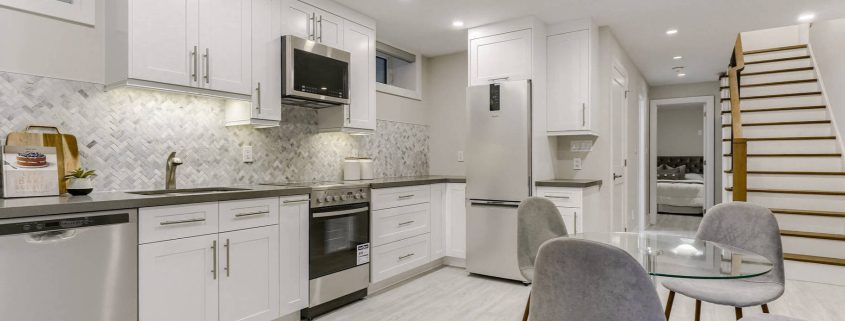What are the Benefits of a Full Height Basement?
Picture this: you’re living in a charming Toronto home with character and history, but every time you venture into the basement, you find yourself hunching over to avoid hitting your head on the low ceiling. That cramped, dark space below your main floor holds so much potential, yet it remains underutilized—functioning as little more than storage for holiday decorations and forgotten furniture. For thousands of homeowners across the Greater Toronto Area, this scenario is all too familiar. The good news? Your basement doesn’t have to stay this way.
Maximizing Space in Toronto’s Competitive Housing Market
In the GTA, where property values continue to climb and available land becomes increasingly scarce, homeowners are looking for creative ways to expand their living space without moving to the suburbs or purchasing a larger property. With detached homes in Toronto averaging well over a million dollars and lot sizes shrinking in newer developments, the solution often lies not in building out, but in building down.
Converting a cramped, low-ceiling basement into a full-height living space through underpinning has become one of the most popular home renovation projects in Toronto. This basement conversion method allows homeowners to transform unusable space into beautiful, functional living areas—adding bedrooms, home offices, rental suites, or entertainment spaces—all while staying within their existing property footprint. For many Toronto families, underpinning represents the difference between staying in a beloved neighborhood and being forced to relocate to find adequate space.
What is Underpinning and How Does It Work?
Underpinning is a foundation reinforcement technique that involves excavating beneath your existing foundation and lowering the basement floor to create additional ceiling height. For an underpinning contractor, this process requires precision, expertise, and strict adherence to engineering specifications.
The typical underpinning process involves several key steps:
The Foundation Assessment: A structural engineer evaluates your current foundation and soil conditions to determine the feasibility and design requirements for your project. This assessment is crucial for ensuring the structural integrity of your home throughout the conversion.
Excavation and Support: The basement floor is excavated in strategic sections while the existing foundation walls are temporarily supported. This staged approach ensures your home remains stable throughout the construction process.
Foundation Extension: New foundation walls are built beneath the existing ones, effectively extending them deeper into the ground. This work is done in carefully planned segments to maintain structural support at all times.
Floor Installation: Once the new foundation is complete and properly cured, a new basement floor is poured at the lower elevation, creating the additional headroom that transforms the space.
The entire process typically takes between 8 to 12 weeks for a standard Toronto home, though timelines can vary based on property size, soil conditions, and the complexity of the project. While underpinning is an investment, the return in terms of increased living space and home value makes it an attractive option for many GTA homeowners.
The Benefits of Converting to a Full Height Basement
Dramatically Increased Living Space
The most obvious benefit of basement conversions through underpinning is the transformation of unusable space into comfortable, functional living areas. Standard Toronto basements often have ceiling heights of just 6 to 6.5 feet, making them feel cramped and uninviting. After underpinning, homeowners typically achieve ceiling heights of 8 to 9 feet or more—meeting or exceeding the standards for above-grade living spaces.
This additional height completely changes how the space can be used. Suddenly, that dark, cramped basement becomes suitable for:
- Legal basement apartments that can generate rental income in Toronto’s competitive rental market
- Home offices that provide comfortable, professional work environments
- Guest suites for visiting family and friends
- Entertainment rooms with proper acoustics and ambiance
- Home gyms, yoga studios, or recreation spaces
- Additional bedrooms for growing families
- Wine cellars, workshops, or hobby spaces
Significant Property Value Increase
In Toronto’s real estate market, square footage is gold. Basement conversions through underpinning can add substantial value to your property. While the exact return on investment varies by neighborhood and the quality of the finished space, homeowners typically see their property values increase by more than the cost of the renovation.
A properly executed basement conversion can add anywhere from 600 to 1,200 square feet of livable space to your home—space that counts toward your home’s total square footage when appraised. In the GTA, where finished square footage commands premium prices, this translates to significant equity gains.
Additionally, homes with legal basement apartments are particularly attractive to buyers, as they offer mortgage-helper potential that can make homeownership more accessible in Toronto’s expensive market.
No Expansion of Property Footprint
One of the most compelling reasons Toronto homeowners choose underpinning over traditional additions is that it doesn’t reduce yard space or trigger the same zoning and setback restrictions that come with building out or up.
In established Toronto neighborhoods, lot coverage restrictions often make traditional additions difficult or impossible to approve. Underpinning allows you to maximize your property’s potential without:
- Reducing precious outdoor space in your already limited yard
- Impacting natural light to existing living areas
- Creating issues with side-yard setbacks or easements
- Requiring variances from the Committee of Adjustment
- Affecting your neighbors’ enjoyment of their property
This is particularly valuable in Toronto’s dense urban neighborhoods where outdoor space is at a premium and properties are close together.
Energy Efficiency and Modern Building Standards
Basement conversions provide an opportunity to modernize your home’s foundation and improve energy efficiency. During the underpinning process, contractors can:
- Install proper insulation that meets or exceeds current building codes
- Add waterproofing systems that protect against Toronto’s wet springs and freeze-thaw cycles
- Upgrade drainage systems to handle the GTA’s increasingly intense rainfall events
- Install modern HVAC systems that better regulate temperature and humidity
- Address any existing moisture or foundation issues before they worsen
These improvements not only make your basement more comfortable but can also reduce your overall heating and cooling costs—a significant consideration during Toronto’s cold winters and humid summers.
Why Underpinning is Particularly Popular in Toronto and the GTA
Land Scarcity and Urban Density
The Greater Toronto Area continues to experience rapid population growth, with the region expected to add millions of residents in the coming decades. However, the supply of available land—particularly in desirable neighborhoods close to downtown, transit, and amenities—remains severely limited.
This scarcity has driven property values to unprecedented levels, making it financially impractical for many families to upsize by purchasing a larger home. Moving from a 3-bedroom house to a 4-bedroom house in the same neighborhood might require an additional investment of several hundred thousand dollars—plus the costs and disruption of moving.
Underpinning offers a more economical alternative. For a fraction of the cost of moving up the property ladder, homeowners can create additional living space in their current home, in the neighborhood they already love.
The Desire to Stay in Established Neighborhoods
Toronto’s established neighborhoods—from the beaches to High Park, from the Annex to Leslieville—offer character, mature trees, walkability, and strong community connections that newer developments simply can’t replicate. These neighborhoods also tend to have:
- Proximity to excellent schools
- Easy access to public transit
- Walking distance to shops, restaurants, and services
- Established community networks and friendships
- Heritage architecture and streetscapes
Rather than relocating to a larger home in the suburbs or a newer development, many Toronto families prefer to invest in underpinning their current home. This allows them to maintain their lifestyle, keep children in the same schools, and stay connected to their community while gaining the space they need.
Potential for Rental Income
Toronto’s rental market remains extremely tight, with vacancy rates consistently below 2% and average rents continuing to climb. This creates an opportunity for homeowners with basement conversions to generate significant rental income.
A legal basement apartment in Toronto can command anywhere from $1,800 to $3,000+ per month, depending on the neighborhood, size, and amenities. For many homeowners, this rental income can:
- Help offset mortgage payments
- Cover property taxes and maintenance costs
- Provide supplemental retirement income
- Make homeownership more affordable for first-time buyers
The City of Toronto has made efforts to streamline the process of creating legal secondary suites, recognizing their importance in addressing the housing shortage. Underpinning creates the ceiling height necessary to meet building code requirements for legal basement apartments, making this income potential a reality.
Important Considerations: Climate, Codes, and Planning
Toronto’s Climate and Waterproofing
Toronto’s climate presents specific challenges for basement conversions that experienced underpinning contractors must address. The region experiences:
Freeze-Thaw Cycles: Winter temperatures regularly dip well below freezing, followed by spring thaws. This cycle can create foundation movement and put stress on waterproofing systems. Proper underpinning includes adequate frost protection and drainage to handle these conditions.
Heavy Precipitation: Toronto receives significant rainfall throughout the year, with increasingly intense storm events. A properly underpinned basement requires comprehensive waterproofing, including:
- Exterior waterproofing membranes on foundation walls
- Proper grading to direct water away from the foundation
- Interior and exterior drainage systems
- Sump pump installation with battery backup
- Proper window well drainage for egress windows
High Humidity Summers: Toronto’s humid summers can create moisture issues in basements. Modern basement conversions include vapor barriers, proper insulation, and HVAC systems designed to control humidity levels and prevent mold growth.
Building Codes and Permits
Underpinning is considered major structural work and requires several permits and inspections in Toronto. Working with a qualified underpinning contractor ensures compliance with:
Ontario Building Code Requirements: Your basement conversion must meet minimum ceiling heights (typically 6 feet 5 inches for basement spaces, higher for habitable rooms), proper egress requirements, adequate natural light, and structural standards.
City of Toronto Permit Requirements: You’ll need a building permit for the underpinning work, electrical permits for any electrical updates, plumbing permits if adding a bathroom or kitchen, and potentially HVAC permits for heating and cooling installations.
Engineering Requirements: A structural engineer must design and stamp the underpinning plans. Regular inspections throughout the process ensure the work meets engineering specifications and building code requirements.
Legal Secondary Suite Requirements: If creating a rental apartment, additional requirements apply, including separate entrances, fire separation, separate utilities or metering, and occupancy permits.
Reputable contractors in the GTA will handle the permit application process and coordinate all required inspections, ensuring your project meets all legal requirements.
Is a Full Height Basement Right for Your Toronto Home?
Determining whether underpinning makes sense for your property involves several considerations:
Current Basement Height: If your basement ceiling is 6.5 feet or lower, underpinning could dramatically improve the space’s functionality. Even basements with slightly higher ceilings may benefit if you’re planning a legal rental suite.
Foundation Condition: Older Toronto homes may already have foundation issues that make underpinning an opportunity to address these problems while gaining space. A structural assessment will reveal whether your foundation is suitable for underpinning.
Long-Term Plans: Underpinning is a significant investment that makes most sense if you plan to stay in your home for at least 5-10 years, or if the added value will make your home more saleable in Toronto’s competitive market.
Budget Considerations: While underpinning costs vary based on property size and scope, it typically costs less per square foot than building an addition and far less than purchasing a larger home in the same neighborhood.
Neighborhood Context: In some Toronto neighborhoods, basement apartments are common and expected. In others, a finished basement might be a unique selling feature. Understanding your local market helps inform your decision.
The best way to determine if underpinning is right for your home is to consult with experienced professionals who can assess your specific property and provide detailed cost estimates and timelines.
Transform Your Basement, Transform Your Home
Converting your cramped, low-ceiling basement into a beautiful full-height living space through underpinning isn’t just about adding square footage—it’s about improving your quality of life, increasing your home’s value, and making the most of your property in Toronto’s competitive real estate market.
Whether you’re looking to create a legal rental suite to help with mortgage payments, add a bedroom for a growing family, build a dedicated home office, or simply want to maximize your property’s potential, underpinning offers a proven solution that works within your existing footprint.
If you’re considering a basement conversion for your Toronto-area home, the first step is connecting with an experienced underpinning contractor who can evaluate your property, discuss your goals, and provide a comprehensive plan and estimate. At Novacon Construction, we’ve helped countless GTA homeowners transform their basements into beautiful, functional spaces that perfectly meet their needs.
Ready to explore the possibilities for your basement? Contact Novacon Construction to schedule a consultation and discover how underpinning could unlock your home’s hidden potential. Let’s discuss your vision and create a plan to make it a reality.
- How Many Dwellings Can I Build On a Single Lot in Ontario? - October 29, 2025
- Home Renovation and Additions in Toronto: Combining Upgrades for Maximum Impact - October 29, 2025
- What are the Benefits of a Full Height Basement? - October 28, 2025







